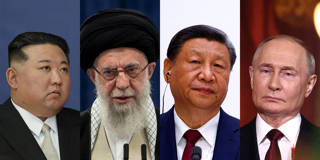
The New Gang of Four
China, Iran, North Korea, and Russia do not have a formal alliance committed to defending one another. But they have formed an alignment driven by shared antipathy toward the existing US-led world order, and there is no simple way for the United States and its allies to respond.
NEW YORK – The Gang of Four was the name given to four senior Chinese officials closely associated with some of the Cultural Revolution’s most radical features. They lost out in the power struggle that followed Mao Zedong’s death, after which they were arrested, convicted of various crimes, and imprisoned.